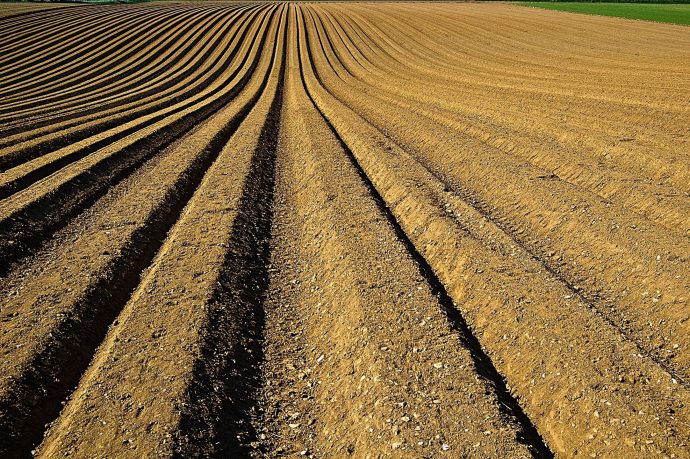After the first World War came the roaring ’20s. And though we usually think about the economic boom of the time in terms of urban areas, rural areas felt it as well. For the farmers, new plows and mechanized farming techniques enabled them to increase profits and farm greater and greater patches of land. In fact, between 1925 and 1930 more than 5 million acres of previously unfarmed land was plowed, and record crops were produced.
But when the Great Depression struck and market prices fell, farmers overcompensated and further expanded their field. As a result, there was virtually no grass left in the area. When the rains stopped, the topsoil blew away with the wind. This was the Dust Bowl.
Historians would point to many causes for that period of time, but at least one of them was the farming techniques employed. Slowly, over the course of years, the soil was eroded. What once was stable and enduring was now blowing away. Though it seemed like it happened suddenly, it was really the culmination of little by little subtle expansion. And the eventual results were devastating.
Perhaps the same thing happens in our souls.
In several places, the New Testament contains lists of sinful habits and decisions, and when you first read lists like these, it’s easy to raise an eyebrow because some of the sins listed there don’t really seem to fit with the others. Here’s one example:
Now the works of the flesh are obvious: sexual immorality, moral impurity, promiscuity, idolatry, sorcery, hatreds, strife, jealousy, outbursts of anger, selfish ambitions, dissensions, factions, envy, drunkenness, carousing, and anything similar. I am warning you about these things—as I warned you before—that those who practice such things will not inherit the kingdom of God (Gal. 5:19-21).
Reading the list, isn’t there a sense in which you take some of these things more seriously than others? For example, sorcery. Pretty serious. But does sorcery really need to be in the same list as jealousy or selfish ambition?
Here’s another example:
Don’t you know that the unrighteous will not inherit God’s kingdom? Do not be deceived: No sexually immoral people, idolaters, adulterers, or males who have sex with males, no thieves, greedy people, drunkards, verbally abusive people, or swindlers will inherit God’s kingdom (1 Cor. 6:9-10).
Same dynamic here. There are sins listed here which we would shake our head in agreement with, but then there are others which we might wonder a little bit. And here is where the example of the Dust Bowl might help just a bit in terms of an analogy. For these sins – these seemingly innocuous and more subtle sins – might not be immediately destructive. Instead, they erode the soul.
No one farming large swaths of land in the last 1920’s and seeing the bumper crops come in thought much about the long term potential damage they were doing to the land. Why would they? The land was theirs; no one else’s. They were minding their own business, tending their own fields, and making a profit doing so. Similarly, these subtle sins are often the ones that are harbored and nurtured in our own hearts. They are of our own field, never reaching outside the boundaries of our stated property ownership. We coddle our jealousy or our greed or our entitlement, never even admitting it to anyone else and putting on a congenial face to the outside. We tend our own field, and all the while, there is erosion taking place in our own hearts.
And then one day the rain stops.
Some tragedy, some disruption, some catastrophe that changes our lives comes about, and suddenly that subtle erosion of the souls becomes very, very visible very, very quickly. All because we have not taken active measures against it earlier.
Perhaps for you today there are these subtle sins in your own field. Perhaps there are those things that aren’t visible to others, the things which seem to do no damage in the near term. Do not be deceived. Erosion is happening – erosion of the soul. We best confront these things, by God’s grace, while the rain is still falling.
Subscribe to MichaelKelley.co
Never miss a new post. Subscribe to receive these posts in your inbox and to receive information about new discipleship resources.





